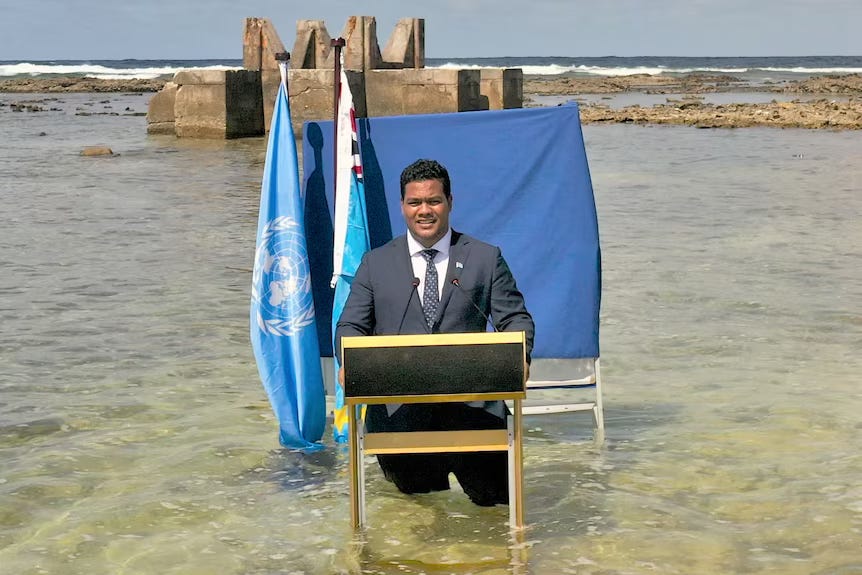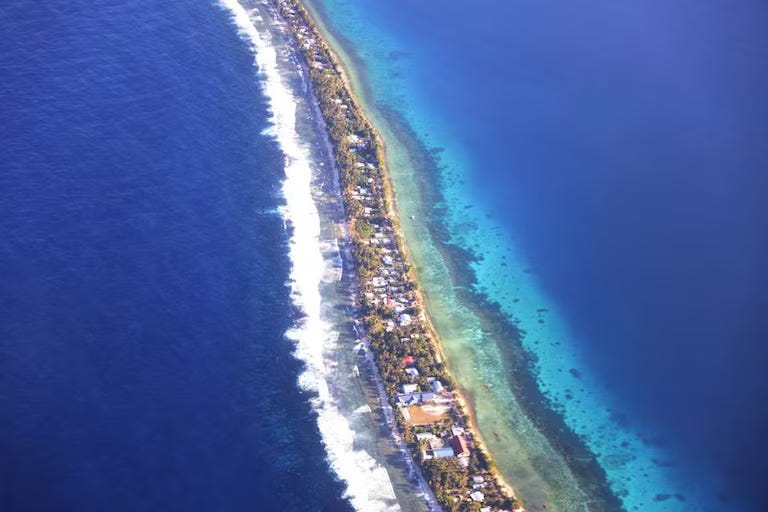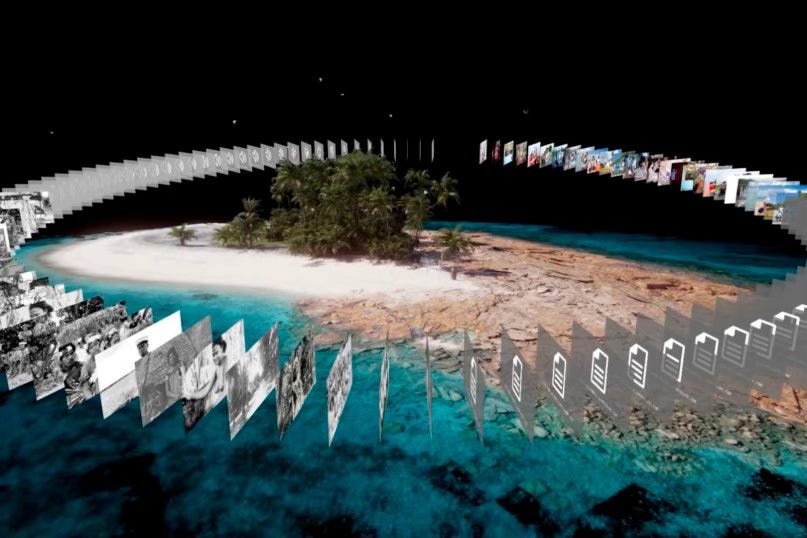Holding On to Memory: Identity amid Climate Migration
Tuvalu is sinking due to the rise in sea level caused by climate change. Will the memory of climate migrants and technology be enough to prevent the nation from being forgotten and disappearing?

One day, the land you live on will start sinking, and you, like many others, will be forced to leave everything behind and migrate elsewhere. Places you once loved, the thousand-year monument and even your home, all gone. For some, this is already a scary reality. Countries like Tuvalu and Indonesia are sinking and their inhabitants are the first ones to face the disastrous consequences of climate change.
When thinking about migrants, the first picture that comes to all our minds is probably a group of individuals who cross the Mediterranean Sea on unsafe boats or people stuck for days inside car trunks, all moved by desperation and hope. But migrants are not only these people, who should be better defined as refugees or asylum seekers. Migrants are also those who move for work, for study, and because of climate change.
Climate migration does not only consist of a physical relocation, but also in the loss of important memories related to the land they lived on. The fear of losing the connection with a part of their identity and not knowing where they belong anymore, because their land is gone, makes climate migrants unique.
Tuvalu and the Climate Crisis
The incredibly small and ancient country of Tuvalu is sinking at a very fast pace. Experts say that by 2050, the island is going to be completely submerged. In the meantime, the water floods football camps and house patios frequently, but it is not bothering the population anymore, as inhabitants have gotten used to the phenomenon. Sands bags have been placed around what is called the “reclaimed land” to prevent land erosion and try to gain time against what looks like an inevitable fate for Tuvalu.
In 2023, Australia and New Zealand committed to receiving 280 and 75 Tuvaluans per year, respectively, providing island inhabitants with the possibility to apply for a “climate visa.” On one hand, this seems like a great solution, and around one-third of Tuvaluans have already applied for the visa. On the other hand, while having a new home and great benefits looks appealing, the inhabitants do not want to leave the island. This small piece of land, which the sea seems to be reclaiming, is many people’s home; it is part of their identities, loved and cherished, holding memories and traditions of generations of Tuvaluans, and this generation is probably going to be the last one to live on the island.
Memory, Identity, and Displacement
With people, language, stories and traditions migrate too. Often, it is forgotten that displacement has a huge impact on the relationship that ties land and culture. The children who are now living in Tuvalu will one day have fading memories of the island and their children will never get to know what it was like to live on it or even just visit their ancestors’ land.
Conserving one’s roots and adapting to a different lifestyle and environment is itself a challenge for every migrant, but when your land is sinking and your heritage, both cultural and territorial, digitized, it might be even harder. Climate migrants bring in their suitcases not only clothes and passports but also memories and identity, which collide with a new culture and a new home. It is precisely that memory that climate migrants cling to.
The process of grieving a person who’s gone is hard, but also a normal experience most of us have gone through or will one day or another. Going through the grieving of the loss of a land and a cultural heritage is something very few around the world have experienced (or are experiencing). Grieving the forever disappearance of physical land and objects that constituted valuable memories due to climate change is perhaps a feeling that Tuvaluans will be the first to experience.
The ways in which memory is defined are various, but in this context the most adapt one was written by Confino (1997), which states that memory is “ways in which people construct a sense of the past”. As the definition asserts, the memory we have about something can be classified into different types of memories, two of which are personal, such as the daily routine or the family house, and communal, like rituals or ancient traditions perhaps related to the land or the sea.
Personal and communal memories are both central and equally important in order to maintain cultural identity amid migration, and often, programs of migrants’ integration forget that, merely prioritizing physical relocation. On this note, I would like to shift focus for a second and remind whoever reads this piece that a community of migrants, even those whose nation is not necessarily sinking, that preserves their language and traditions in a new country, is just protecting their cultural identity from being lost, and instead passed from generation to generation. Not trying to impose a culture, not trying to not integrate, not trying to disrespect, just trying to preserve an identity.
In the experiment of diaspora, Tuvaluans are being somewhat forced to adapt and create something unique that still represents their original identity, but that also blends with the new one. This means developing new traditions that mix Tuvaluans’ identity with Australian costumes and land, therefore shaping new personal and collective memories. Can this process cure the sense of nostalgia for a land that no longer exists? Probably not, or at least not completely, but perhaps can help with a new hard beginning.
As said by the Cultural Identity Theory of Collier & Thomas (1988), cultural identity is fluid and shaped by ongoing interaction between old and new cultural contexts, but when the old will pass away and the young, whose memories of Tuvalu’s land are blurred, will be the only ones having set foot and lived the essence on the island, what will happen to the cultural identity? Of course, the preventive move of digitizing the nation was undeniably a good decision, but it is unarguable that the next generation of Tuvaluans will eventually lose attachment to land, secret and historical spots, as they have never touched it with their hands, but only saw it through a digital portal and imagined it thanks to stories.
Sovereignty and Statehood of a Digitized Nation
Digitizing the geographical and cultural heritage of Tuvaluans, as well as its people, to ensure the land exists in a virtual world is one of the strategies adopted by Tuvalu’s government. To digitize a nation, replicate perfectly the land, backup its traditions and its people, developers used software usually implemented for gaming. Now, Tuvalu has become the first digitized nation with a faithful 3D lidar scan of its 124 islands, so while Tuvaluan’s will most likely be forced to leave their land, it will still visually be there with them, just behind a screen.
What happens to the sovereignty of people when their land it’s gone? Well, it’s surely complicated and a first-time issue for everyone. To begin with, a state definition implies that it consists of four elements: a population, a defined territory, a government, and the capacity to build relationships with other states, two of which Tuvalu won’t have anymore after the land sinks.
Since 2023, the government of Tuvalu has achieved agreements of recognition as a State, also without a proper land or a defined population, with two of which are New Zealand and Australia. The number of aspects that remain a question mark is many. As reported by The Guardian, for instance, around half of Tuvalu’s income is made from selling fishing licenses, but when completely digitized, will Tuvalu still be entitled to own rights over maritime territory?
The article in The Guardian also explores the possibility of a change in the definition of statenhood, in the likely event that Tuvalu will be the first but not the last state to sink or suffer from climate change consequences.
With the likelihood, backed by scientific data, that Tuvalu will geographically disappear by 2100, many questions arise about the future of its people, cultural heritage and the memory of the physical territory, such as whether Tuvaluan identity will survive in the new process of migration due to climate change, how it will be reshaped by the adaptability with a “new home” and how newer generations will remember their beloved nation.
In the future, we will discover whether, with the years, memory will slowly fade and a country will become a story narrated through a 3D virtual book, or whether the memory and the grieving process will strengthen the sense of belonging. One thing is for sure: Tuvalu’s people may be the first ones to ever be called climate migrants of a sinking nation, but if something is not immediately done to stop the catastrophic consequences that climate change has on our Earth, they will not be the last ones.





this was an amazing piece to read, not only because it’s informative about the disasters climate change is provoking, but also because it highlights the creative solutions humans are developing to preserve both material and immaterial heritage. it’s the kind of news that helps me stay hopeful despite the harshness of the situation.
What a beautiful and harrowing piece this is! It’s awful that none of this makes mainstream news, and it’s truly upsetting to think that Tuvaluans will lose their land and have something digital as their reminder of home. Thank you for writing this 🫶🏻